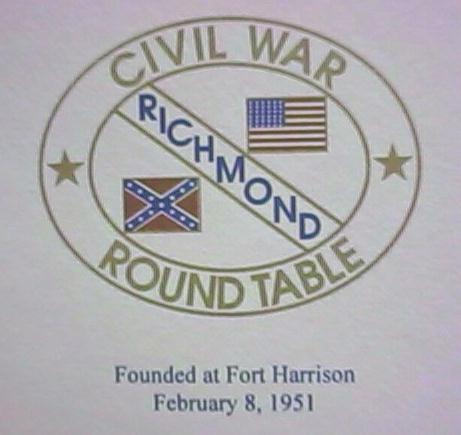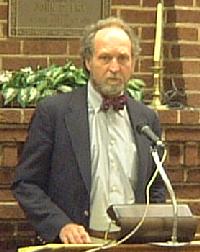


October 2003
rcwrt.org
Brag Bowling, President Rob Monroe, Editor 3019 Kensington Ave 2416 Edenbrook Dr. Richmond, VA 23221 Richmond, VA 23228-3040
October 2003 PROGRAM Dr. Lawrence L. Hewitt "The Confederacy's Best Chance for Victory: Robert E. Lee and the Battle of Annihilation" 8:00 p.m., Tuesday, October 14, 2003, at the Boulevard United Methodist Church, 321 N. Boulevard, Richmond, VA (corner of Boulevard and Stuart Ave.) Enter the basement door on the right side under the front steps. A native of Louisville, Kentucky, Lawrence Lee Hewitt received his B.A. from the University of Kentucky. After attending graduate school there, where he studied under Charles P. Roland, Hewitt transferred to Louisiana State University. Following the death of T. Harry Williams, he completed his dissertation under William J. Cooper, Jr., and received his Ph.D. in 1984. Hewitt was the manager of the Port Hudson Historic Site (1978-1982) and the Camp Moore Confederate Cemetery and Museum (1982-1986); in 1985 he joined the faculty of Southeastern Louisiana University. He served in a variety of capacities in the Baton Rouge Civil War Round Table, including that of president. He attained the rank of full professor before resigning in 1996 to marry a native and resident of Chicago. Hewitt's presentation consists of a slide show dealing with the book on which he currently is working. It consists of three parts: (1) The historiograpy of "The Lost Cause" since 1865-focuses on the arguments previously presented regarding why the South lost, or even if the Confederacy ever had a chance to survive, much less win the war; (2) Lee, Davis and Confederate Strategy, 1861-1863-argues that Lee and Davis thought the Confederacy could win and describes how they determined to achieve that goal; and (3) Lee at Gettysburg-argues that the four Confederates who contributed most to Lee's defeat at the battle did not include Stuart, Ewell, or Longstreet. Though some of the second part agrees with the writings of Joseph Harsh and much of part three was recently described by Scott Bowden and Bill Ward, the overall argument, which reflects more than forty years of study of the Lee and his army by the speaker, runs counter to the current trends of historical scholarship.
Review of the September Program
 |
Upcomming Events
Pamplin Historical Park and the National Museum of the Civil War Soldier will hold its seventh annual symposium on October 18 and 19. "Corps Commanders of the Army of Northern Virginia" will feature Frank O'Reilly, Gordon Rhea, Jeffrey Wert and other nationally respected speakers, as well as a group tour. Reservations are required and may be made on the park's website, www.pamplinpark.org or by calling toll-free 1-877-PAMPLIN. The annual reenactment of the Battle of Cedar Creek will be held October 18 and 19. The Cedar Creek Battlefield Foundation will host the event on the actual Frederick County battlefield. For more information call 1-888-628-1864 or log on to www.cedarcreekbattlefield.org
Campbell to Step Down as Executive Director of Museum of the Confederacy The Board of Trustees of The Confederate Memorial Literary Society has announced the upcoming retirement of Col. J. A. Barton Campbell, executive director of The Museum and White House of the Confederacy. Campbell, who left the Board of Trustees to head the museum in 2002, will be stepping down after his replacement has been appointed, probably in early 2004. Board Chairman J.E.B. Stuart IV said of Campbell's decision: "Although the Board and museum staff are extremely sad at the prospect of Col. Campbell's departure, the reality is that in 2002 the Board requested that he help out for a specific short-term mission, which he has fulfilled." Campbell, who had already retired from careers in the military and corporate sectors when the board appointed him executive director, always projected a finite term in the position. He will continue his service to the museum as a volunteer and will return to the Board of Trustees next year. "In addition to his outstanding leadership in helping to strengthen our financial position, Campbell's unbridled enthusiasm for the museum has helped bolster the confidence of long-time supporters," Stuart said. "He has also brought many new fans and new members to the museum, so our future looks very bright." The Board of Trustees is conducting a national search of museum executives to fill the executive director role. In other Museum news, a massive horse chestnut tree in the garden of the White House of the Confederacy fell victim to Hurricane Isabel. The tree was probably planted by Dr. John Brockenbrough, who in 1818-19 created the garden and built the Court End mansion which five decades later would serve as The White House of the Confederacy. The fallen tree was the last of the three or more historic chestnut trees that once shaded the garden. Only an oak tree remains from the original early 19th-century garden. The week the storm hit, The Museum and White House of the Confederacy was in the process of documenting the horse chestnut for nomination in The National Registry of Historic Trees. Now it simply awaits sectioning and disposal. Anxious to retain some connection with the chestnut tree, the museum staff is entertaining suggestions about possible commemorative products that may be made from the tree's wood. Anyone interested in learning about the final disposition may inquire of the museum in mid-October.
Annual Holiday Dinner The Richmond Civil War Round Table's annual holiday dinner will be held on Tuesday, November 11, at the Willow Oaks Country Club. Our speaker will be Robert K. Krick, and his topic will be "The Confederate Pattons." The cost per person is $25.00. The meeting schedule will be as follows: 6:00-7:00 p.m. - Cash Bar 7:00-7:45 p.m. - Dinner 7:45 p.m. - Meeting begins 8:00 p.m. - Speaker All members are urged to attend this Holiday Dinner. Please fill out the form below, clip it out, and send it to Art Bergeron, 3901 Paces Ferry Road, Chester, VA 23831-1239. Make all checks payable to the Richmond Civil War Round Table. Let any interested friends know about the meeting and tell them that they are welcome to attend. If you have special dietary needs or prefer a vegetarian meal, please indicate this on your form. ------------------------------------------------------------ Richmond Civil War Round Table Annual Holiday Dinner Reservation Form Name _______________________________________________________ Address ____________________________________________________ ____________________________________________________________ Number of persons attending _____________ Amount of check $ _______________ ------------------------------------------------------------
Newsletter Deadlines To facilitate the printing and timely distribution of the monthly newsletter, information for it should be submitted to the editors no later than the following dates: November newsletter, October 24 December newsletter, November 21 Information may be emailed to rmonroe@richmond.com
RCWRT Monthly Speakers for 2003
Richmond Civil War Round Table Newsletter Rob Monroe, Editor 2416 Edenbrook Dr. Richmond, VA 23228-3040
Return to News Letters Index
Return to main page

©R.C.W.R.T. 2003